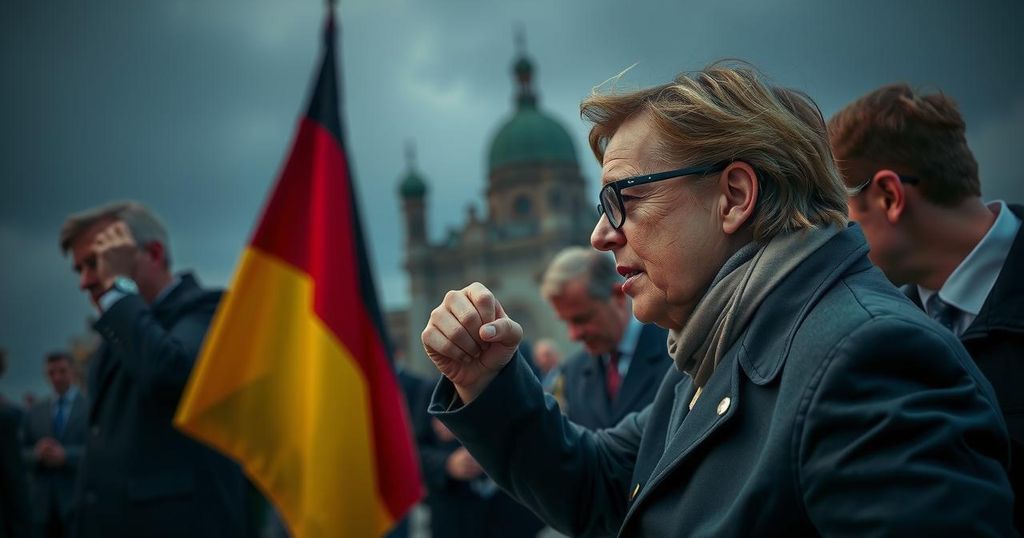Chancellor Olaf Scholz is under pressure to step aside for Defense Minister Boris Pistorius as the SPD prepares for the February elections. Recent polls show a decline in Scholz’s popularity, prompting calls from within the party for a candidate change. Pistorius, favored for his relatability, could provide a fresh face for the SPD as they face the center-right CDU amid growing electoral challenges.
Germany’s Chancellor, Olaf Scholz, is facing intensifying calls to relinquish his position as the Social Democratic Party’s (SPD) candidate in the upcoming February election in favor of Defense Minister, Boris Pistorius, who is currently the most popular politician in the nation. High-ranking officials within the SPD are reportedly convening for urgent discussions regarding their chancellor candidate, particularly as Scholz returns from the G20 summit in Brazil. Speculation is growing that the SPD might opt for a candidate change, similar to a notable shift witnessed in a previous U.S. election when Joe Biden endorsed Kamala Harris. Since taking office, Scholz has managed a turbulent three-way coalition, which recently collapsed following the dismissal of Finance Minister Christian Lindner. Although Scholz is adamant about pursuing a second term, his leadership has faced criticism, particularly regarding the party’s declining support. Recent polling indicates that Scholz’s popularity has dropped considerably, placing him at the bottom of a ranking of Germany’s top politicians. In contrast, Pistorius has maintained a strong standing among the electorate. Growing dissatisfaction among SPD members is reflected in calls for a change of leadership as the party struggles to position itself against the center-right Christian Democrats (CDU) and their candidate Friedrich Merz. Former SPD leader Sigmar Gabriel publicly expressed concern over the party’s direction, arguing that failing to adopt a more assertive approach could lead to even lower approval ratings. The CDU has reportedly doubled the SPD’s support, which is currently at a mere 16%. Challenges for Scholz have been exacerbated by a broader anti-incumbent sentiment prevalent in Western democracies, fueled by rising inflation and social inequality largely attributed to the ongoing repercussions of Russia’s invasion of Ukraine. Critics assert that Scholz’s detached demeanor and ineffective governance have contributed to the SPD’s woes. Political analysts suggest that the SPD lacks momentum, calling for someone like Pistorius, who reportedly embodies greater relatability and authenticity as a candidate. While Pistorius has previously downplayed ambitions to replace Scholz, he indicated a willingness to consider the prospect, stating, “In politics, you should never rule anything out.” Despite increasing pressure for a change, Scholz’s cautious political stance on Ukraine and the implications underlying his lack of support could hinder a transition to Pistorius as the new candidate. The opposition within the SPD’s leftist faction might also complicate any initiative to elevate Pistorius as the party’s face heading into the election.
The current political climate in Germany is marked by internal strife within the SPD, driven by perceptions of Chancellor Scholz’s ineffective leadership. Scholz’s administration has faced significant pressure from various factions within his party, particularly given the brief tumultuous period marked by the coalition’s collapse. This deep-seated unrest has led to considerations of a leadership change, with Pistorius emerging as a more favorable figure among voters and party members, who are increasingly critical of Scholz’s capacity to lead effectively in the upcoming election.
In summary, Chancellor Olaf Scholz is encountering substantial pressure to step down as the SPD’s candidate for the February election in favor of the more popular Defense Minister Boris Pistorius. With the SPD experiencing dwindling support amid public dissatisfaction and internal discord, pivotal discussions are set to reshape the party’s electoral strategy. The urgency for decisive action reflects a critical juncture for the SPD as it navigates a challenging political landscape.
Original Source: www.theguardian.com






